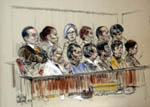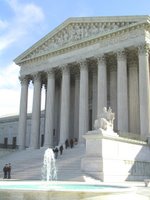While New York personal injury law is what I want my tiny corner of cyberspace to be about, and not bloggers and the blogosphere, I step back today to reflect on the two months since I started on November 17, 2006.
First, I want to thank those who assisted in private emails and with links placed at their sites, particularly those legal blogs in New York. That certainly helped me get started.
I’m pleased that links were provided not just as part of a long blogroll, but to the content. Nicole Black, the queen of New York legal bloggers residing over at Sui Generis, has now linked to several of my entries, and has provided wonderful reading on all things New York.
Cyrus Dugger over at Tort Deform and Corp Reform has cross-posted my comments on issues of national importance concerning the attack on our civil justice system by large corporate interests that seek various levels of immunity for negligent conduct. This includes my comments on Gov. Eliot Spitzer’s attempt to reform New York courts, the ruling that an Oklahoma court “reform” law was unconstitutional, and other matters. Author Stephanie Mencimer over at The Tortellini writes on a similar subject and has also passed a nod or two my way.
The Blawg Review, perhaps the most widely read of all legal blog compilations on the web, has now included me in two issues, the first of which was #89 regarding my note on a federal judge preventing the use of a pseudonym in a sex assault case. In issue #91, two different posts on emotional injuries were noted: The first on the tax exempt status of emotional injury compensation, and the one on zone of danger emotional injuries.
The Health Wonk Review picked up a bit I wrote regarding counterfeit drugs, as did the Health Business Blog by David Williams. I’m particularly grateful for these, as I assume many in health care have more than a bit of skepticism about personal injury attorneys. Also in the health field, Juvan’s Health Law Update has been a great source of information to me on the continuing issue of the Prescription Drug Marketing Act and recent legal maneuvers that have stalled its implementation. (And the recent redesign of the site is simply superb.)
Finally, the Health Business Blog hosted the Cavalcade of Risk blog carnival this week, and noted the post I put up on Geico’s idiotic idea to put up “safety” billboards at the George Washington toll booth plaza. Even a caveman would know it isn’t safe to distract drivers in such a location with needless billboards.
I’m delighted (and flattered) that different communities of bloggers (New York-centric, tort “reform” and health care policy) have included my comments in their postings.
I’m now getting at least two dozen different feeds from various blogs (including all those in my blogroll), am constantly adding new sites, and am quickly finding it to be an outstanding source of information.
Now if only I had picked a wittier name for my blog…
 Yesterday I had a pool of 30 jurors. Four of them were lawyers. One tried personal injury cases.
Yesterday I had a pool of 30 jurors. Four of them were lawyers. One tried personal injury cases.
